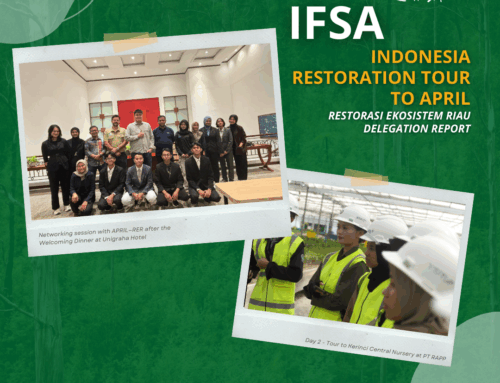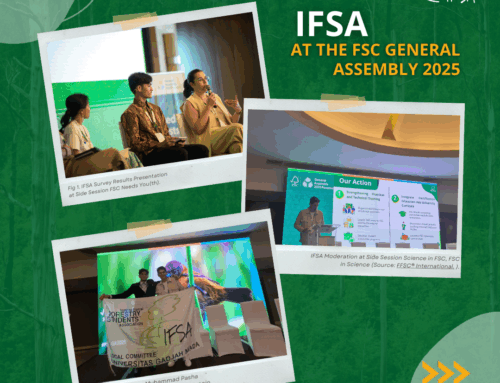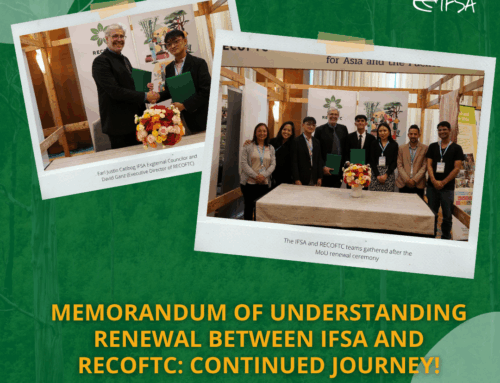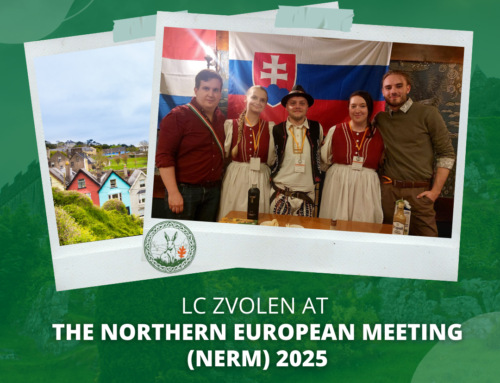IFSA Delegation Report at the 6th GLF Investment Case Symposium
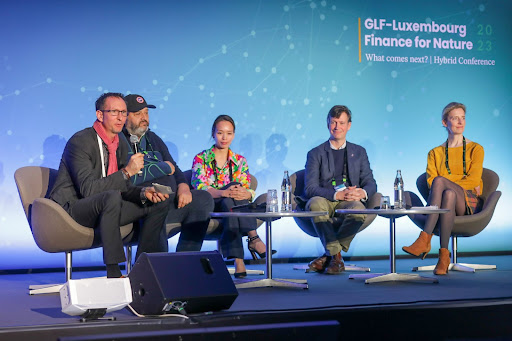
- Experience as an IFSA delegate
My name is Fiana Eka Aprilia, the Human Resource Development commissioner of IFSA LC UGM, I have had the opportunity to be part of IFSA’s delegations to the GLF Africa Digital Conference that was held on 15th September 2022, Asia Pacific Regional Meeting for 2023, and most recently IFSA’s delegation to GLF Luxembourg which was held on 7th March 2023.
I decided to apply and join the IFSA delegation to GLF Luxembourg because of my interest in economics, especially in the forestry sector. I believe economics plays an essential role in solving world problems, including in the forestry sector. A good economic sector will certainly lead to improved livelihoods and community development, fulfilling the needs of all stakeholders.
In addition to writing this delegation report, I also took part in live reporting with other delegates from IFSA LC UGM, which you can also see on IFSA LC UGM’s highlight insta stories here
More session highlights can also be found on the links below as recaps :
- https://www.instagram.com/p/CqZmiRDvY_X/?igshid=YmMyMTA2M2Y=
- https://www.instagram.com/p/CqZn7tIv2Hc/?igshid=YmMyMTA2M2Y=
- https://www.instagram.com/p/CqZoawoPtmo/?igshid=YmMyMTA2M2Y=
- https://www.instagram.com/p/CqZo2IiPaz_/?igshid=YmMyMTA2M2Y=
- About GLF & the 6th GLF Investment Case Symposium
The Global Landscapes Forum (GLF) is the world’s largest knowledge-led platform on integrated land use. It is scaling up to significantly contribute towards the Sustainable Development Goals (SDGs) and the Paris Agreement led by CIFOR.
The 6th GLF Investment Case Symposium was held in Luxembourg, Germany, on 7th March 2023 under the theme “Finance for Nature.”
GLF Luxembourg aimed at concrete solutions to drive sustainable land use investments in the Global South, demonstrated how barriers can be overcome to catalyze private sector investment, and identified investable community-led business models. The forum was attended by 4,657 participants from 162 countries, 106 speakers, and 100 global and local partner organizations and reached 15 million people on social media. The discussion was also related to new strategies and innovations from well-known companies that still pay attention to the environment.
| Session title: Demonstrate what works: Better impact monitoring to scale nature-based investments |
Highlights:
- During this session, there was a discussion with investors who shared their perspectives about what impacts matter, why that matters, and how they can actually be used to mobilize.
- The first speaker, Lennart Duschinger, pointed out that most of the real-world impact of the investments that we are doing is invisible. The invisibility creates a disconnect between the financial sector and the real-world impact on the economy and society. The financial sector plays a crucial role and enables the transition towards a more sustainable future. Lennart also mentioned that sustainability data poses several challenges for the financial sector, but now the European Union is moving to fundamentals and trying to tackle the challenges.
- The next speaker, Dr. Johannes Mossinger, focused on ecosystems valuation and the integration of ecosystem services into the design of nature-based solutions planning. He presented the outcomes and the objective of a part of the funded projects, which was to identify, develop, and implement a framework that can scale in a digital way that supports data collection, data analysis, reporting, and monitoring.
- The next speaker, Dr. Thomas Asbeck, presented biodiversity monitoring in times of climate change, ecoacoustic monitoring for impact assessment, and the advantages of digital biodiversity monitoring.
- The last speaker, Claudio Petucco, presented the environmental impact monitoring and assessment, and the session ended with a panel discussion.
|
Key messages
- The speakers spoke about their perspectives on impact and its influencing factors against the backdrop of the ventures the investors undertook. The purpose of this discussion was to provide opinions and treatments regarding impact monitoring and evaluation measures that can then be applied by employers, not only by the speakers’ companies but all parties.
|
|
Session title: How to scale finance for ecosystem restoration: Solutions from the private sector and development partners |
Highlights:
- In this session, the discussion focused on the UN Decade on Ecosystem Restoration. Fiona from the World Bank mentioned that: UN Decade has more than 61 partner organizations supporting and scaling up to reverse the degradation of ecosystems and raise awareness about the importance of successful ecosystem restoration.
- They demonstrated to us the roadmap pillars for the restoration that are really important. Restoration is a component of this new financial sector architecture. A case study was also included in the discussion because it is crucial to getting communities involved and local engagement.
- In Rabobank, there was a discussion about investments based on the restoration of lending by a bank to farmers.
- The conclusion is that scalability and replicability are important not only that there are certain prerequisites to fulfill that make it faster to progress.
- There was also a discussion on the AGRI3 fund mission which will support investments in sustainable agriculture, forest production, and rural livelihoods.
|
Key messages
- Regarding this session, the main thrust was to discuss restoration by scaling up the finance directed by companies to safeguard the environment while still being financially sustainable. This is an important basis that can affect companies’ viability, especially those in the private sector or development partners.
|
|
Session title: Accelerating nature-based businesses in the Global South |
Highlights:
- In this session, the speakers discussed a company or business that is being undertaken and the need to learn more about the way we planned because it’s about climate change.
- There was a discussion on making wine from tropical fruit and directing the target market by optimizing the harvest so that it will not be affected when selling and obtaining continuous results regardless of the specific harvest season.
- In addition to this, there were some steps for handling the impact of conservation and biodiversity. There is a need to identify the problem and know the clear market, and then try to have a big solution and monitor it, which needs to be visible, valuable, and sustainable.
|
Key messages
- This session discussed the importance of protection and awareness of conservation and biodiversity and, most importantly to identify the problem and know the stakeholders involved try to have a scalable solution and evaluate it, which needs to be visible, valuable, and sustainable.
|
|
Session title: Interview with Namita Vikas |
Highlights:
- This session was an interview with Namita Vikas, the founder of the caucuses. Issues about society and the environment have been important for Namita ever since she was young, and that builds her career today. Due to that, currently, she focuses on emphasizing the significance of climate actions within finance institutions. auctusESG has worked with many stakeholders like countries’ governments and sovereign states across Europe, Asia, and Africa. According to Namita, financing for nature means recognizing the challenges of keeping capital profitable and conserving nature at the same time while also providing solutions that go beyond the protection of nature and also vouch for economic stability in low-income countries.
|
Key messages
- The key message in this session is to see that financing nature is an obligation by recognizing nature and its challenges and preserving it, and ensuring solutions guarantee economic sustainability, especially for those who have companies, services, and jobs in sectors that directly or indirectly protect and conserve the environment.
|
|
Session title: Cooperative carbon finance: enabling smallholder agroforestry at scale through carbon markets |
Highlights:
- Max Berkelmans, the finance lead of Rabobank, shared about the Rabobank initiative called Acorn for smaller farmers to ensure they can make a transition to agroforestry practice). The transition to agroforestry is by offering sequestered carbon to responsible corporations, and Rabobank monitors the biomass, credit, and also revenue. In fact, only 1.7% of climate finance reaches the smallholders in the field of conservation and mitigation efforts.
- Pieternel Boogaard, Tim Diphoorn, Ineke Keers, and Catherine Martini, discussed ensuring that carbon markets can actually be a very good idea for improving finance.
|
Key messages
- This session was very interesting because it discussed the carbon market from the small sector. The carbon market sector is certainly a very hot issue discussed because this sector will provide great benefits in terms of economic improvement and environmental protection. So in this case, ensuring a good carbon market is finally discussed, and its implementation is more clear and directed.
|
|
Session title: Closing the nature finance gap: practical solutions to mobilize private finance for landscape restoration |
Highlights:
- The session opened with a statement that restoration seed capital facility partners with different strategies are still needed to reduce the funding gap needed for nature. The first thing that we need is to identify and develop business models that combine the production of commodities with better environmental and social outcomes.
- The discussion was attended by Martin Halle from UN environment, Paul Brueder From Shared Food Company and Hannah Skelly from Arbaro Advisors. All speakers shared about the way their organization/community handle and protect the ecosystems. The point is to protect, restore, and also reduce unsustainable consumption.
|
Key messages
- One of the key messages from this session was that in restoration, the most fundamental thing we can do is to identify and develop business models that combine commodity production with better environmental and social outcomes.
|
References
https://events.globallandscapesforum.org/6th-glf-investment-case-symposium/
https://www.globallandscapesforum.org/wp-content/uploads/2022/11/ConceptNote-GLF-Luxembourg-2023.pdf
Written By: Fiana Eka Aprilia, IFSA LC UGM
Edited by: Elivis Omoit, Head of Sub-commission CIFOR/YIL

